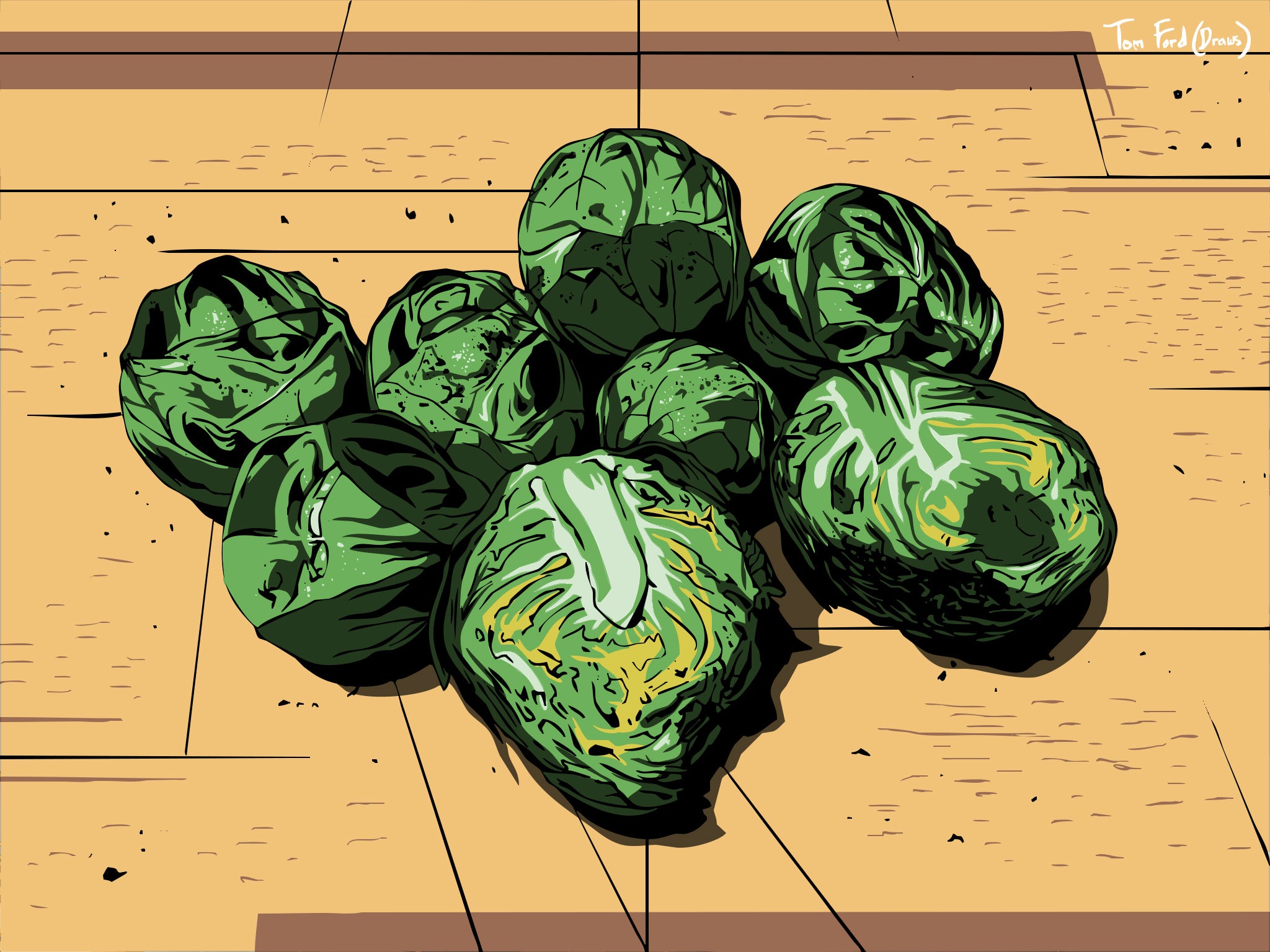Do you want sprouts?'
Continuing her series tackling socially unacceptable questions, Christine Manby examines one which is bound to spark buck’s fizz-fuelled controversy over the festive period


What are you having for Christmas dinner? Turkey? Beef? Nut roast? Yorkshire pudding with your chicken*? Forget the meat/not meat. If there’s one thing guaranteed to divide the nation on Christmas Day (apart from yet another repeat of Only Fools and Horses), it’s the question of brussels sprouts. Do you love them or loathe them? Are they an essential part of your family’s Christmas dinner or not?
The chances are, they will be on your Christmas table. Britons eat more sprouts than any other Europeans, with Barnsley in North Yorkshire being the nation’s unofficial sprout-eating capital, according to a 2015 survey by Morrisons. The UK produces more than 80,000 tonnes of sprouts a year, weather permitting, and most of them are eaten locally.
In our family, the sprout lovers and loathers are pretty much evenly split. Over the years, sprouts have been the source of much gentle disagreement. Even our old dog Ben had a view. He wouldn’t touch them. Not even if you covered them in gravy. One year, Dad (pro-sprouts) doctored a couple of Christmas crackers for the sprout deniers so they contained sprouts instead of gifts. This led my brother-in-law and I to consider the commercial potential of the mass-manufacture of sprout-containing “Christmas crappers” (with the same joke in every cracker and pre-ripped paper hats). Discussing this idea and the huge financial possibilities has since become another of our family Christmas traditions. Dragon’s Den this time next year, Lee?
Personally, I love sprouts and have never understood the fuss. To me, they taste much more interesting than parsnips or carrots. I would swap broccoli for sprouts any day of the year. My sister on the other hand, thinks sprouts are the Devil’s work. Last year, she and her husband hosted Christmas lunch and sprouts were significantly absent. This year, I’m hosting Christmas lunch and my sister is going to Disney Land.
It helps to know how to cook sprouts properly, which apparently does not mean putting them on the boil on 23 December, however hard they may seem
Joking aside, there seems to be a scientific basis to the violent negative reaction some people have to the innocent little green veg. They really do taste different to different people and apparently it’s all down to a gene called TAS2R38. If you’ve got the gene, then you’ll have a higher than usual number of receptors for bitter tastes on your tongue and thus sprouts will taste especially bitter to you. Up to 60 times more bitter than they do to people without the gene, in fact. That’s officially nasty.
It’s also the case that children are naturally more sensitive to bitter tastes, hence the cliche of a child’s aversion to green vegetables. It’s actually useful to be sensitive to bitterness when you’re small and don’t yet know with an adult’s experience what’s safe to eat. Hopefully the nasty taste of that poisonous berry will make you spit it out before it can do any damage. However, we all lose some of that sensitivity as we get older, therefore, what tastes vile when you’re seven can be delicious when you’re 70. And it is possible to train yourself to like bitter tastes through repetition. If it wasn’t, hardly any of us would get past our first pint of beer.
But some people dislike sprouts not for their taste but for their texture, which is most commonly described as “soggy”. It helps to know how to cook sprouts properly, which apparently does not mean putting them on the boil on 23 December, however hard they may seem. Overcooking sprouts gives them more chance to develop that nasty “rotten egg” smell, by encouraging the release of the sprout’s high levels of sulforaphane (which is also responsible for the rotten egg smell that pervades the atmosphere by other means long after dinner is over).
For that reason, the method I’ve always considered to be the “fancy” way of doing sprouts, cutting a cross into the bottom, may actually be the worst possible way to prepare them. That cross allows too much water to be absorbed during the cooking process. Instead the experts say they should be steamed or microwaved, or even sliced and stir-fried, adding chestnuts and pancetta if you’re so inclined. Restaurateur Mark Williamson of Macéo and Willi’s Wine Bar suggests simply cutting them in half and roasting them with the rest of the Christmas veg.
Scientists have found a striking correlation between a preference for bitter-tasting food or drinks and a number of psychopathic personality traits
Sprouts are well worth getting used to. They’re low in calories but high in all sorts of other goodies, such as vitamins, minerals and fibre. They contain loads of vitamin C – four times more than the average orange, which is why explorer Captain Cook made his crew eat sprouts to combat scurvy – and they’re especially rich in vitamin K, which is important for regulating blood clotting and the health of our bones. Vitamin K protects against osteoporosis.
Brussels sprouts are also packed with antioxidants, including one called kaempferol, which may lower inflammation and oxidative damage, improving heart health and decreasing rates of cancer-cell growth. In especially good news for vegetarians and vegans, they are one of the best vegetable sources of ALA (alpha-linolenic acid) omega-3 fatty acids. Combined with the sprout’s high fibre content those ALA omega-3s may help to control blood sugar levels. Then there’s folic acid, which aids conception. Sprouts contain plenty of that, which is perhaps why the Duke and Duchess of Cambridge are rumoured to have eaten lots of sprouts on their honeymoon.
Antioxidants, vitamin K, and enough folic acid to help you make a football team… sprouts really are a superfood. They’re the new kale. Add them to a smoothie. Make them into bircher muesli. Or go all Deliciously Ella, slice one in half, sandwich it back together with almond butter and call it a recipe.

But before we natural-born sprout lovers get too pleased with ourselves, some recent research has shown that a penchant for bitterness may reveal something more profound than the configuration of the taste receptors on our tongues. In 2015, scientists at Austria’s Innsbruck University found a striking correlation between a preference for bitter-tasting food or drinks and a number of psychopathic personality traits, including aggression, sadism and Machiavellianism. The scientists hypothesised that psychopathic types embrace bitterness because they’re crazy risk-takers, willing to play Russian roulette with their veg, eating things that might kill them just for the hell of it. Meanwhile, nicer people stay closer to home, sticking to the sweet stuff they know isn’t going to poison them, and putting extra sugar in their tea.
On the subject of beverages, apparently psychopaths are more likely to choose a black coffee over a latte and they enjoy the taste of gin. These are all helpful indicators for spotting the psycho at your next family gathering. I’m thinking of running my own investigation into the sprout-loving psychopath theory this Christmas by seeing whether those family members who say “yes” to sprouts at lunch on the 25th are more likely to be found cheating in a Boxing Day game of Monopoly. Sprouts, gin, coffee without sugar? That great aunt is already looking increasingly suspicious…
*Obviously eating Yorkshire pudding with chicken is wrong but anyone who would deny anyone else the pleasure of a Yorkshire pudding on Christmas Day is in need of a visit from three ghosts.
Christine Manby has written numerous novels including ‘The Worst Case Scenario Cookery Club’
Join our commenting forum
Join thought-provoking conversations, follow other Independent readers and see their replies
Comments